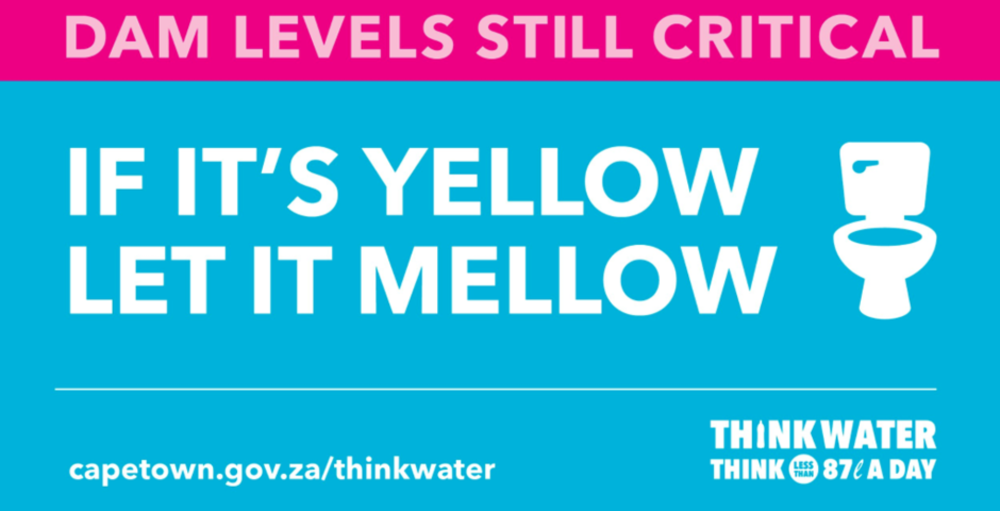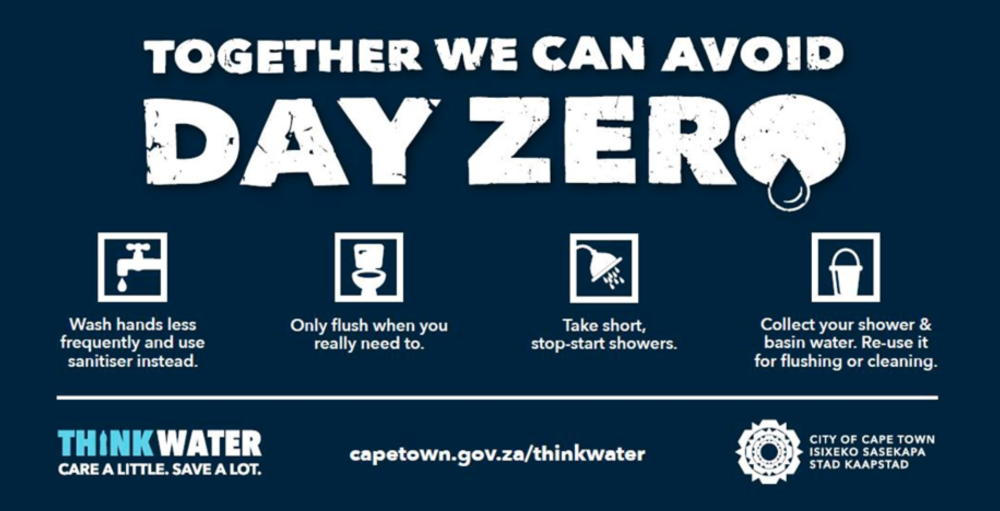Would “we” get out of “it” if we acted “together”? Lessons on the future of water management five years after the alleged Day Zero crisis in Cape Town
Our new intern Ariadna Romans developed her thesis this year in the city of Cape Town, where guided by the Future Water Institute (FWI) at the University of Cape Town (UCT) she delved into the lived experiences of low-income women in the city relating to water. After this, she wrote this article on how the city is experiencing water scarcity five years after its world-known “Day Zero”.
Exactly five years ago people in Cape Town looked up at the sky and smiled. Miraculously and without really knowing exactly why, it was raining. The city had been going through one of the most important droughts in history for months, and the news from around the world had spread panic about what could be an apocalyptic scenario: being the first city in the world to run out of water. Well, it was not exactly the first, but the epic and the story, added to a political strategy of generating maximum alert to achieve great results, made some exaggeration necessary and easy to justify in such a critical moment. It is said that humans react late to everything. We cannot (yet) prove it scientifically, but at the moment some good evidence leads us to think that it is true. When encountering environmental crisis, it may be likely that societies reacted too late. The case of Cape Town is a clear example of this, but it also teaches us two important lessons: it is never too late, and no action is too small.
When do you know that there is little water left?
At the beginning of the new millennium, a group of South African researchers carried out a study showing that, if everything continued as it was at the moment, the city would run out of water in a few years. However, as is often the case with bad news, the report was not given much attention and many of its claims were questioned because they were just possibilities. Speaking with some of the researchers a few months ago, such as Professor Anthony Turton, they revealed to me the great feeling of helplessness they felt at the time: “no one wanted to accept what was inevitable to happen, but in this country politicians never want to listen to the scientists until they have no choice but to do so”. The fact is that in February 2018 the city was aware of the water emergency, and some immediate measures were applied to reverse the crisis. The drought did not occur suddenly. Since 2015, the region has seen its rainfall drastically reduced and water reserves slowly decreasing. However, the alarm was not raised until the most fearsome challenge was faced by the city: if it did not rain, we would run out of water.
What do you do when a city starts to run out of water?
Water saving slogans filled the entire city, measures were put in place to restrict household consumption, such as limiting 25 liters per person per day or prohibiting filling swimming pools, watering gardens or washing cars. Farmers had to highly restrict their irrigation systems but the tourism sector, due to its importance to the local economy, hardly noticed any differences. The industry continued to use a lot of water and the population soon realized that, although everyone would be affected by the lack of water, not everyone would suffer in the same way. To now continue the story, it is important to mention two factors. The first is that Cape Town is one of the most unequal city in the world, and South Africa is one of the countries with the highest Gini Coeficient[1] in the world (0.61). The second is that despite its reforms after apartheid and the efforts the country is making towards democracy, it is yet characterized by rigid structures and systems that may suffer from corruption.
One of the first things to recognize was the importance of articulating a shared story, a story that calls for collective action and the commitment of every single citizen: “only together will we get out of this.” To ensure this, explanatory videos, posters and other resources were disseminated to disseminate good practices. The city council generated an entire strategy that sought the complicity of citizens, and this allowed them to gain a lot of time before reaching a critical point.
An example of a poster made by the Cape Town Municipality with a catchy slogan about how to use the toilet.
Cape Town Municipality poster on good practices for water reduction.
But this was not the only public policy promoted. Other measures were much more extreme, and viewed in a much more defiant way by citizens. For example, civil society surveillance groups called the water police were established to monitor water use and penalize those people or communities that misused water. These measures, although at first they generated a sense of alarm and allowed the cost to be greatly reduced, in the end they contributed to a much more hostile environment of punishment and persecution, which in turn generated a very tense atmosphere between neighbors and communities.
Another major measure was the establishment of a total of 25 liters per person per day, limiting the use of pipes and infrastructure that exceeded this amount. This was one of the problems that burst more inequality in the city. In fact, more people are living in houses than those actually registered; moreover, many inhabitants are not registered. Therefore, the water allocation did not include these groups of people. This generated long lines to get water and many difficulties for those people who were in very precarious living situations before the crisis. Therefore, it did not take long to see citizen movements demanding fair access to water with slogans such as “water for all or the city must fall.” Although the distribution of water was deeply unequal and some miscalculations were made, largely due to seasonal rains but also as the result of great collective action, Cape Town successfully went through its water crises. Ther is much more other case studies can learn from it.
The search for other sources of drinking water was another of the great debates that the city went through. From searching for aquifers in preserved natural spaces such as Table Mountain, which is the large mountain in the middle of the city, recognized as one of the great wonders of the world, or techniques such as desalination, extremely expensive and not very efficient.
What can we learn from a water crisis?
Not every crisis creates an opportunity, but you can learn something from every situation in life. From the water crisis in Cape Town, although we can highlight many inconsistencies and complexities of the system, we can also point out some lessons that it leaves for other cases of conflict or scarcity of the resource. First, all cities must expand their awareness of the role that water plays in their management and governance. This is also highlighted how a crisis is managed can severely affect inequality and persistent problems in a territory according to expert Anthony Turton. Along these lines, another important lesson that the Cape Town crisis gives us is that, although its origin was found in the lack of water, the problem led to a social and political crisis. Therefore, something that originates from an environmental challenge can have severe effects on many other areas of our society.
Some of the city's main water experts recommended actions such as grey water treatment, wastewater reuse or promoting innovative technology such as water collection systems, and have stated that the maintenance and renewal of infrastructure is key for a society to be resilient and efficient at the water level.
Would “we” get out of “it” if we acted “together”?
One of the things we must understand is that water crises are slow, invisible and complex, but they permeate a territory and can be deadly. To date, poor water governance has perpetuated power inequalities and determined unequal access to water for all social classes and territories in a region. Water is, to date, an essential resource for human life but it is unfairly distributed, misunderstood and poorly managedhttps://www.graduateinequalityreview.com/ari.html. Barcelona, Chennai, Tel Aviv, and Sao Paolo are some of the cities that today are threatened by water challenges. Water is and will be one of the most important issues to govern climate change, an essential piece to promote social resilience to these inevitable changes. Therefore, it is important to assess how these consequences have evolved to know if we can learn something from what happened and how to adapt it to other contexts.
Climate change will affect different regions of the world, and different social strata, differently, but we must govern in a connected way if what we want is to get out of this for us all. Starting with something as essential as water can be a good first and firm step.






